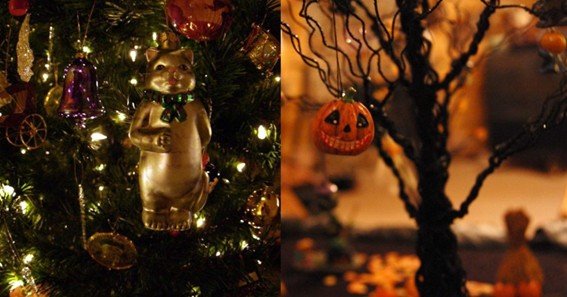The debate over why is halloween worse than xmas has been a topic of conversation among cultural commentators and consumers for years. While both holidays boast unique traditions and widespread popularity, many argue that Halloween presents more challenges—ranging from safety concerns to excessive commercialization—compared to the warm, family-oriented spirit of Christmas. In this post, we explore various aspects of the debate and present insights into how each holiday impacts society.
A Cultural and Commercial Comparison
The Cultural Landscape
One of the most frequently cited reasons behind the argument “why is halloween worse than Xmas” stems from cultural values.
-
Halloween’s Edginess:
Halloween is celebrated with costumes, horror themes, and sometimes, edgy or controversial imagery. For some, this edgy nature can be seen as promoting a more cynical or anti-family culture compared to the universally recognized goodwill and generosity associated with Christmas. -
Christmas Tradition:
Christmas, on the other hand, is steeped in long-established traditions of family, kindness, and community spirit. Its focus on togetherness, thoughtful gift-giving, and festive decor tends to evoke a more positive emotional response among many people.
Commercialization and Consumer Impact
-
Over-Commercialization:
Critics who argue that Halloween is worse than Xmas often point to its rapid commercialization. The period leading up to Halloween is filled with aggressive marketing campaigns that emphasize costumes, decorations, and party supplies. Some believe that this commercialization overshadows the holiday’s original spirit and may lead to unnecessary consumerism. -
Balanced Commercial Appeal at Christmas:
Although Christmas is also highly commercialized, its marketing is generally viewed as reinforcing traditional values and is often associated with charitable giving and community support, offsetting some of the negative impacts of commercialization.
Safety and Environmental Concerns
-
Safety Issues on Halloween:
Halloween is notorious for safety concerns. Increased incidents of vandalism, accidents during trick-or-treating, and hazards associated with inappropriate costumes or decorations are points of criticism. Additionally, the use of disposable costumes and decorations may contribute to environmental waste. -
Christmas Safety:
While Christmas is not without its safety challenges (such as holiday-related fires or injuries from poorly installed decorations), many communities have established safety protocols and awareness campaigns around these risks. The nature of Christmas festivities also tends to encourage family supervision and community vigilance.
Social and Psychological Perspectives
-
Perception of Negativity:
Some argue that Halloween’s dark themes and portrayals of horror can contribute to negative psychological impacts, especially among younger children, when compared to the nurturing and optimistic messages often seen during Christmas celebrations. -
Uplifting Tone of Christmas:
Christmas generally promotes messages of hope, reconciliation, and warmth. This positive social messaging has a profound effect on public sentiment and contributes to the holiday’s enduring popularity.
Frequently Asked Questions
-
Why is halloween worse than xmas according to some people?
Many argue that Halloween is worse than Christmas because of its edgy, often controversial themes, aggressive commercialization, and higher incidence of safety and environmental issues. In contrast, Christmas is generally viewed as promoting family values, positivity, and community support. -
Is the commercialization of Halloween really a significant issue?
Yes. Critics claim that the heavy emphasis on costumes, decorations, and party supplies can overshadow the holiday’s cultural roots. The aggressive marketing may encourage excessive consumerism, which some feel negatively impacts the holiday experience compared to the more balanced commercialization seen during Christmas. -
What safety concerns are associated with Halloween?
Halloween safety concerns include a higher risk of accidents during trick-or-treating, potential exposure to unsafe costume materials, and increased incidents of vandalism or misbehavior. These issues are often highlighted as reasons why some view the holiday less favorably than Christmas, which has stricter community safety measures in place. -
Does halloween have any positive aspects when compared to xmas?
Absolutely. Despite its criticisms, Halloween also offers creative freedom, a platform for artistic expression, and community engagement through events like haunted houses and costume parties. However, when comparing the overall impact, some feel that the negatives of Halloween outweigh these positive aspects—especially in contrast to the more universally uplifting spirit of Christmas. -
Can improvements in Halloween practices change public perception of the holiday?
Potentially, yes. By promoting safer celebrations, reducing waste through sustainable practices, and balancing commercialization with community initiatives, the negative aspects of Halloween could be mitigated. This, in turn, might shift public opinion, narrowing the perceived gap between Halloween and Christmas.
Conclusion
The discussion on why is halloween worse than xmas is complex and nuanced, blending cultural, commercial, and societal factors. While Halloween offers unique experiences and creative expression, its issues related to safety, environmental impact, and commercialization present challenges that many find less appealing when compared to the traditionally wholesome nature of Christmas. Ultimately, the perception of these holidays is subjective, but understanding the differing impacts can help communities work toward preserving the positive aspects of both celebrations.
Keep reading for more information on la-91-fm










